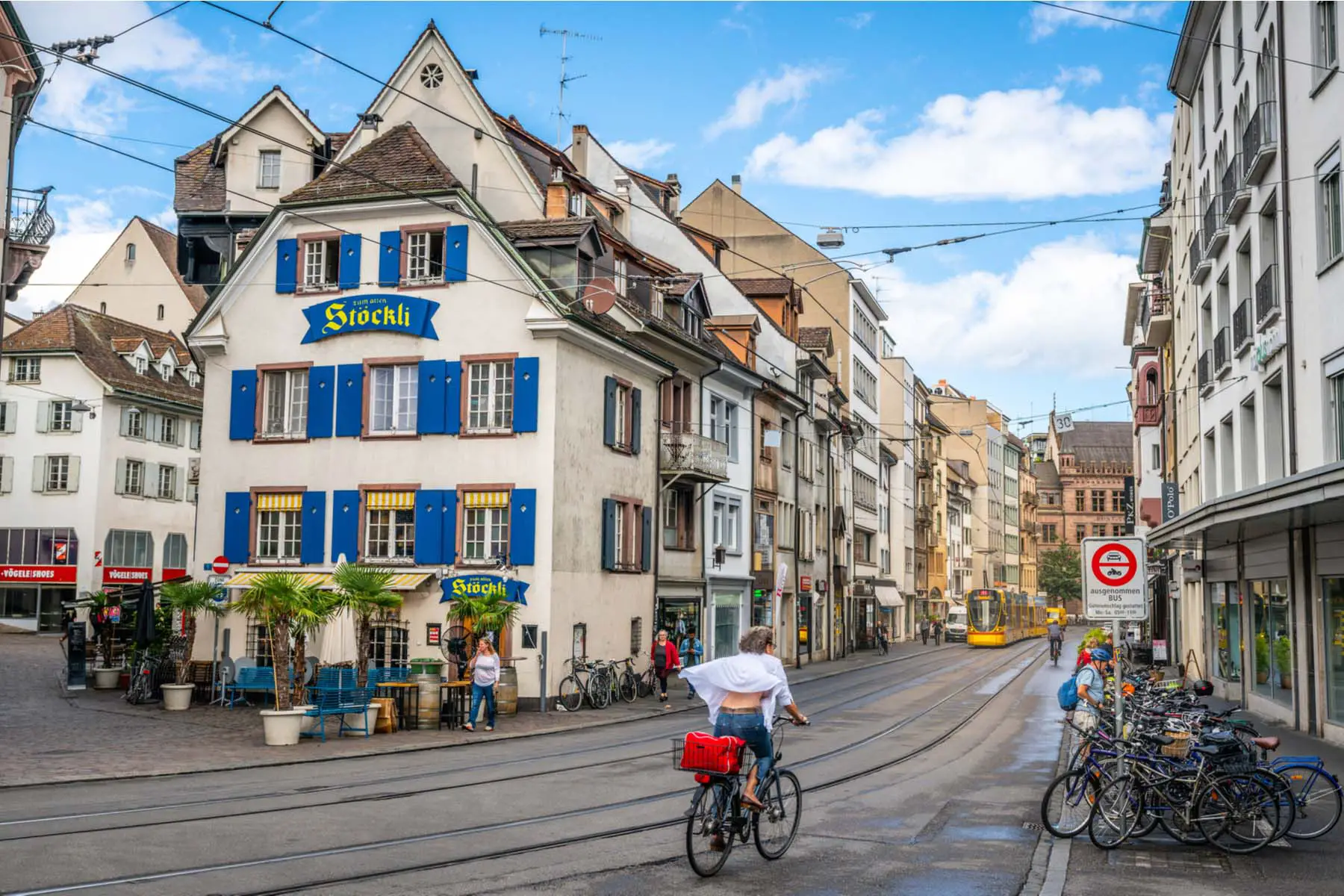Firstly, welcome to your new life in Switzerland! You’ll soon find that this cozy little alpine country has loads to offer expats. From idyllic cities on the shores of pristine lakes to quaint villages perched on the side of majestic mountains, Switzerland has it all. And the best part is, you can now call this beautiful little country home.
However, even in a place as pretty as Switzerland, the first few days in a new country can be challenging, even for seasoned expats. After all, getting to grips with a new system in a language that you may not understand is never easy. But don’t let that put you off, because your new life in Switzerland will soon get better. We promise.
To make it easier, here are the 10 most important things to sort out during your first week in Switzerland.
Airbnb
Looking for a home away from home in Switzerland? Airbnb is a global online community offering accommodation and experiences. They have a selection of over 6 million unique properties available through their secure booking service. So, whether you're moving to Zürich, Geneva, or elsewhere, Airbnb has the right short-term let for you.
1. Find somewhere to live
This might sound obvious, but chances are you’ll need to find somewhere to live when you arrive in Switzerland. Some expats might be lucky enough to be placed in accommodation by their employers. However, most will need to find somewhere to call home, even if it’s temporary. Thankfully, you have plenty of options in Switzerland. You may prefer something more short-term, such as a serviced apartment or long-term holiday rental – you can find many options on Airbnb. These are great options to tide you over while you look for your new Swiss home. However, be aware that you will need to stay at the same address throughout the registration process, which can take several weeks.

If you’d prefer to get started with something a little more permanent, though, you might want to consider renting a property in Switzerland. The Swiss rental market is a good place to start for expats arriving in the country. However, keep in mind that rental prices might be higher than you’re used to, regardless of where you’re looking in the country. The easiest way to find something that meets your needs is by employing a local real estate agent. If you’re looking for an idea of what’s out there and where you should be looking, be sure to check out a Swiss online property portal, such as Comparis and Homegate.
2. Register with your local municipality
One of the most important things you should do during your first week in Switzerland is register with your local municipality (commune/Gemeinde). New arrivals from all countries must register if they are planning to live or work in Switzerland or stay in the country for longer than three months. Importantly, you must register with your local municipality within 14 days of arriving in the country, and before your first day of work. You’ll likely need to do this in person at your municipality’s resident registration office. That said, you typically won’t need to make an appointment ahead of time.

While this might sound a bit daunting to arrange within your first two weeks of arriving in Switzerland, it is essential when setting up your new life in the country. Furthermore, be sure to check what you need to provide in advance as this will depend on you and your family’s circumstances. Registration costs can also vary between cantons and municipalities, so make sure you know what you’re expected to pay to avoid any unforeseen costs. Once you’ve successfully registered and completed the necessary biometrics, you should receive your work/residence permit documents within four weeks.
3. Sign up for health insurance
All foreigners living or working in Switzerland are required to take out Swiss health insurance within three months of arriving in the country as part of the registration process. Exemptions do exist for some arrivals, such as certain pensions, embassy staff, and cross-border workers, to name a few. However, typically speaking, you’ll need to take out insurance to cover you and your family. Some of the main health insurance providers in Switzerland include:
For more information on the level of care you can expect to receive in your new home, read our guide to the Swiss healthcare system.

As well as health cover, there are other types of insurance that you might want to consider when moving to Switzerland. For example, if you plan to drive there, you’ll need at least third-party cover with your car insurance plan. You’ll also need building and fire insurance if you buy a Swiss property. Those renting might also want to consider taking out contents insurance, although this isn’t a mandatory requirement. You can find more information about this in our guide to insurance in Switzerland.
4. Open a Swiss bank account
As any expat living in Switzerland will tell you, opening a Swiss bank account will help you feel more settled in your new home. Getting your hands on that brand new bank card will make you feel like you’re firmly planted in your Swiss life. Not only that, but it will also make everyday tasks a lot easier; from setting up all those bills and payments to paying for groceries at your local supermarket.

Banks in Switzerland are either national or cantonal, meaning that they typically focus operations in a specific canton. The biggest national Swiss banks include UBS, Credit Suisse, and Raiffeisen, but there are numerous cantonal options. The easiest way to open an account with any bank is by visiting a branch in person. That said, an increasingly popular alternative for expats in Switzerland is mobile banking. These typically offer easier sign-up processes and more flexibility. Some Swiss mobile banks include:
If you need to transfer money from your old accounts, then money transfer platforms such as CurrencyFair and Wise can also help.
5. Get a Swiss SIM card
Want to keep in touch with all your new friends in Switzerland? Or perhaps you need a local number to help boost your employment prospects? Whatever the reason, getting a Swiss SIM card will make a big difference to your life. Generally speaking, even arrivals from EU countries won’t be able to access free roaming in Switzerland. This means that even for short-term stays, getting a Swiss number can be cost-effective and convenient. Depending on what best suits your needs, you can either opt for a prepaid SIM card or a mobile plan. Regardless of what you choose, though, be sure to download these must-have Swiss apps to make your life easier.

Once you arrive in Switzerland, you’ll quickly realize how many choices you have when it comes to the Swiss mobile market. While this may seem confusing to the untrained eye, Swiss mobile options are actually very similar to those in other countries. Therefore, be sure to do your research ahead of time to avoid signing up for the wrong contract. Whatever you choose, though, the sign-up process is typically straightforward, even for expats. Some of the leading mobile operators in Switzerland include:
- Swisscom
- Salt
- Sunrise
6. Find a job
Some expats arriving in Switzerland will be lucky enough to already have a job secured before they move to the country. However, others will need to find employment while they sort out their new life. Due to the generally high salaries and good working practices in Switzerland, the local job market can seem competitive to outsiders. But for many foreigners – particularly highly-skilled ones – securing that dream role with a Swiss company can be achievable.

If you’re looking for work, it’s best to get the ball rolling during your first week in Switzerland. For example, you might want to tweak your resume for the Swiss job market or contact some local job agencies that operate in your preferred sector. You could also start looking through Swiss job portals and our own Expatica jobs board. The Swiss job market is generally fairly strong but you’ll often find that roles are filled without being advertised. With this in mind, it’s important to give yourself the best chance of securing a job by being proactive and networking whenever you can.
7. Sort out your transportation options
Another important thing to think about during your first week in Switzerland is transport. Your transport options will largely depend on where you want to settle. For example, in larger cities like Geneva, Zurich, and Basel, you may want to stick to public transport. Here, you’ll find trams, buses, and metros that will get you to where you need to be. Generally speaking, Swiss public transit is clean, efficient, and reliable. This includes the many intercity trains that connect Switzerland’s largest cities and international routes.

Another option in Switzerland is cycling. In larger cities, you will often find public bike-sharing platforms such as Publibike. Of course, you can always buy your own bike, too. Many expats, on the other hand, might prefer to drive in Switzerland. This will likely be the case if you are planning to live in a more rural area, where public transit is not as widely accessible. Expats arriving in Switzerland who are over the age of 18 can use their foreign driving license for up to 12 months, although they may need to apply for an International Driving Permit to use it. For more information, read our guide to getting a Swiss driving license.
8. Get your home connected
Once you’ve found your new home in Switzerland, you’ll probably need to get it connected to all the Swiss utilities and telecommunications you need. Typically speaking, serviced accommodation and some rental properties will already have these connections set up and their cost will be included in your monthly rent. This is also the case for flatshare rentals where costs are split between housemates. That said, many Swiss rental properties won’t have these connections, so you will need to set them up. Of course, the same applies if you are buying a property in Switzerland.

While this may sound like a lot of hard work, you shouldn’t worry too much. Thankfully, sign-up procedures for Swiss internet and TV services are typically straightforward. That said, be sure to do your research ahead of time to make sure that you get the best options for you and your family. Some of the main Swiss internet and TV providers include:
- Salt
- Sunrise
- Swisscom
In Switzerland, electricity, gas, and water are operated at local levels which means that you won’t be able to choose a provider. However, you will still need to sign up with your local supplier as soon as possible.
9. Enrol your children in school
If you’ve relocated with kids, then you’ll want to sign them up for local schools during your first week in Switzerland. However, before you do, it’s essential that you get to grips with the Swiss education system. In Switzerland, education is largely organized on a cantonal level, which means that things can vary between areas. Although public schools are a good option for expats, many prefer international schools which typically offer global programs, such as the International Baccalaureate. You can read more about this in our guide to international schools in Switzerland.

If you’ve got younger children, then you’ll probably need to sort out your childcare options in Switzerland. It’s often a good idea to start looking as soon as possible as places can fill up fast, particularly if you’re after a certain type of care such as English-speaking. Prices can vary considerably between childcare centers, so make sure you know what you’re signing up for in advance. Once the kids are sorted, you might also want to start with your own education in Switzerland, such as learning the local language at one of the many language schools in Switzerland.
10. Explore your new Swiss home!
Remember, you only have that first week in Switzerland once, so make sure you get out there and make the most of it! That’s right. While this list of tasks may seem a little daunting to the uninitiated, they are relatively straightforward to arrange, so don’t get too bogged down. After all, Switzerland is one of the most beautiful countries in the world, and full of great things to see and do. So, give yourself a break from opening bank accounts and brushing up on your Swiss German dialects, and explore your new home. After all, you didn’t move to Switzerland to spend your time researching SIM cards!

Wherever you settle in Switzerland, you’ll have plenty of opportunities to get out there and explore your new home. From hiking through that exquisite Swiss scenery to taking a dip in your local lake, there’s something for everyone. However, if all that sounds a little too active, then why not simply enjoy a wander around your local town or neighborhood? After all, seeing what your new home has to offer and discovering all the bars and cafés on your doorstep is always fun!




